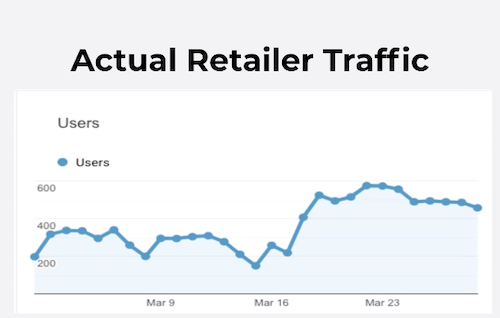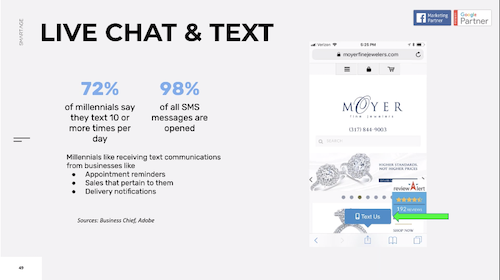Articles and News
Tactical Ways To Grow Your Business During COVID-19 | August 11, 2020 (1 comment)

New York, NY—Although the COVID-19 pandemic has scared many consumers away from in-person shopping, it’s not the end of the retail world, especially for jewelers. In fact, many independent jewelers are doing quite well.
Not only is it possible to grow your business during this pandemic, it might even be the best time to grow your business! Emmanuel Raheb, CEO of Smart Age Solutions, points out that less competition means not only more business for you, but that it will cost you much less to get that additional business. In a webinar presented through JewelryEcomm.com, Raheb presented a series of tactical, use-it-now ways for retail jewelers to grow their business both online and in-store.
Raheb was in the jewelry e-commerce business during the 2008 recession, and many of the lessons he learned then have shaped and informed Smart Age’s strategies. Smart Age, which works exclusively in the jewelry industry, has built hundreds of websites for both retailers and brands, and is the only premier Google Partner in the industry. It also is a Facebook Marketing Partner. Although SmartAge does work with brands, its main mission is “to help brick-and-mortar jewelers compete, win, and own their backyards.”
If that sounds like a strange mission for a former e-commerce executive, that’s exactly why he created it for Smart Age.
“Clicks-only e-commerce is a losing proposition for jewelry,” says Raheb. Repeat business is about 23% at best, with both poor customer loyalty and very high price sensitivity. Online-only retail has begun to morph into physical presence, such as Brilliant Earth, which has about seven retail showrooms. Blue Nile continues to experiment with physical showrooms, and famed online eyewear brand Warby Parker is now up to 90 physical retail stores across the United States. Even Amazon is looking to open physical locations.
Online or off, the one thing no retailer should ever do is stop marketing in downtimes. “In 2008, a lot of companies took a knee-jerk reaction to the recession. They cut costs, including staff and marketing spend. As a disciplined advertiser, we know that’s usually not the best thing to do,” says Raheb.
“That’s what I call the ostrich effect. People panic and don’t look for opportunities or the silver lining. They put their heads in the sand and say ‘I’m not going to do anything right now.’”
Related: How To Survive Coronavirus, And We Don’t Mean Hand Sanitizer
But it’s during those times that you can really grow, said Raheb. While stores were closing in 2008, Raheb was celebrating. Why? Because he went from having 30 competitors to only three. That meant immediate increases in his numbers.
Less competition equal less noise, which means a cheaper dollar penetration and increased conversion, he explained. In 2008, it’s true that people were buying a lot less. But people were still buying.
In 2007, Raheb had to spend $3.00 to get one click in his online store. By 2008, his online ad cost was $0.75 per visitor. Even if his conversion rate was cut in half, it still cost him much less per sale. The economics are the same for online stores, he stressed. “Less competition equals less noise which allows you a much greater dollar penetration and cheaper conversions.”
Today, a jeweler’s website is a storefront. A beautiful informational site is no longer enough.
There’s been a 50% increase in web traffic during the pandemic, says Raheb. That means a nice in-store experience is no longer enough, either. Many storeowners will scrutinize their in-store experience down to the last fingerprint or immediately fixing a squeaky door, but haven’t given the same attention to their online experience. Luckily, there are more tools than ever to help, and they’re cheaper and more effective than ever.

The chart above shows actual website traffic from one of SmartAge's retailer clients. Notice that web traffic shot up in mid-March as the pandemic lockdowns took place, and stayed elevated since. Web traffic is still dramatically higher for jewelers, says Emmanuel Raheb. Image: SmartAge Solutions
Here are eight tactical ways to improve your website and online experience:
1. Product is the biggest change. “Clients are no longer looking for one big banner, they’re looking for specific products,” says Raheb. “Think of your website as a store. Big splashy images of beautiful people wearing jewelry don’t work if you don’t have product! You need to have product because that’s what you sell and that’s what your consumers are coming for.”
2. Good images are critical, he stressed. “You wouldn’t buy a shirt if the photo was taken with an iPhone and not professional photography. Poor photos will actually make you look worse!” he said. (Editor’s note: There are many in-store camera options available to take good professional-quality photos yourself. For tips to better DIY photos, click here and here.)
3. Make sure your website has call-to-action items. These are very important and deserve both an icon and a button. “As an e-commerce company, we lived and died by calls to action!” says Raheb. Use phrases like “add to cart,” “add to wishlist,” “book appointment,” “call us,” and so forth.
4. Reviews. Put reviews onyour website, emphasizes Raheb. “70% of people who leave your website never come back, so why not show good reviews on your website? There are so many tools out there that you can put these good reviews right on your site so people don’t have to leave your site to read reviews.”
5. Announcements. Putting announcements in a prominent location—like your landing page—seems obvious, but at the height of the pandemic, many good jewelers didn’t think of it, says Raheb. “This is so wrong! People don’t know if they’re open, closed, doing appointment-only, whatever. Put any announcements like your safety procedures right up front!”
6. Make sure your website is nimble and agile for frequent updating. For building a website, Raheb only likes platforms that can convert and make sales and that are open to continuous updating and upgrading. Don’t use DIY or content-based platforms such as Wordpress, Squarespace, Wix, Weebly, and so on, advises Raheb. They’re great sites, he says, but they weren’t built for e-commerce. They’re more for blogging and information, not hard-core e-commerce conversion. He also advises against closed-source proprietary solutions, which makes it hard to be nimble or agile.
“At Smart Age, we only recommend open-source e-commerce solutions like Magento-based, or BigCommerce, or Shopify. These are mainstream platforms you can build a website on and you’re not necessarily tied to one development company.”
7. Live Chat and Text. By far, the winning horse right now is live chat and live text, says Raheb. Millennials, especially, are heavy text users but in general 98% of text messages are opened! Particularly important is response time: if you’re going to text, you need to respond immediately and you can’t lag in response time, stresses Raheb. Immediate means immediate: Raheb says a response time just five or 10 minutes later means an 80% decrease your chances of having the sale come through!

Choose a live chat and/or live text option and put it on your website. SmartAge offers one, but there’s also Facebook Messenger, which is free, and a platform called LiveChat that Raheb says is very good. Whatever one you choose, “Don’t leave your customers high and dry!” he emphasizes again. (Editor’s note: you don’t have to lose sleep--literally--over a customer text. You can set up auto-responses for overnight hours so the customer gets an immediate answer, then get back to them for real in the morning.)
8. Virtual assistance and video chats. Make sure your landing page has appointment-setting functionalities because this is a great way for jewelers to communicate when the store is closed, says Raheb. You don’t need expensive video-conferencing software, either. SmartAge recommends four readily-available free platforms for video chatting: Facebook Messenger, Google Hangouts or GoogleMeets, Instagram, and Zoom.
Raheb gave retailers six homework assignments to immediately improve their online presence:
- Upload updated inventory to their website
- Add reviews to the site using a beacon tool
- Add any recent updates on hours or safety protocols and so on in a prominent place—and be sure to update those any time a change is made.
- Build a virtual appointment-setting page on your website
- Choose and set up your preferred video chat platform
- Announce and market your virtual appointment and video chat capabilities!
Next tactical lessons: Using Google search, clienteling, increasing market share, and more. To watch the entire webinar online, click here.







